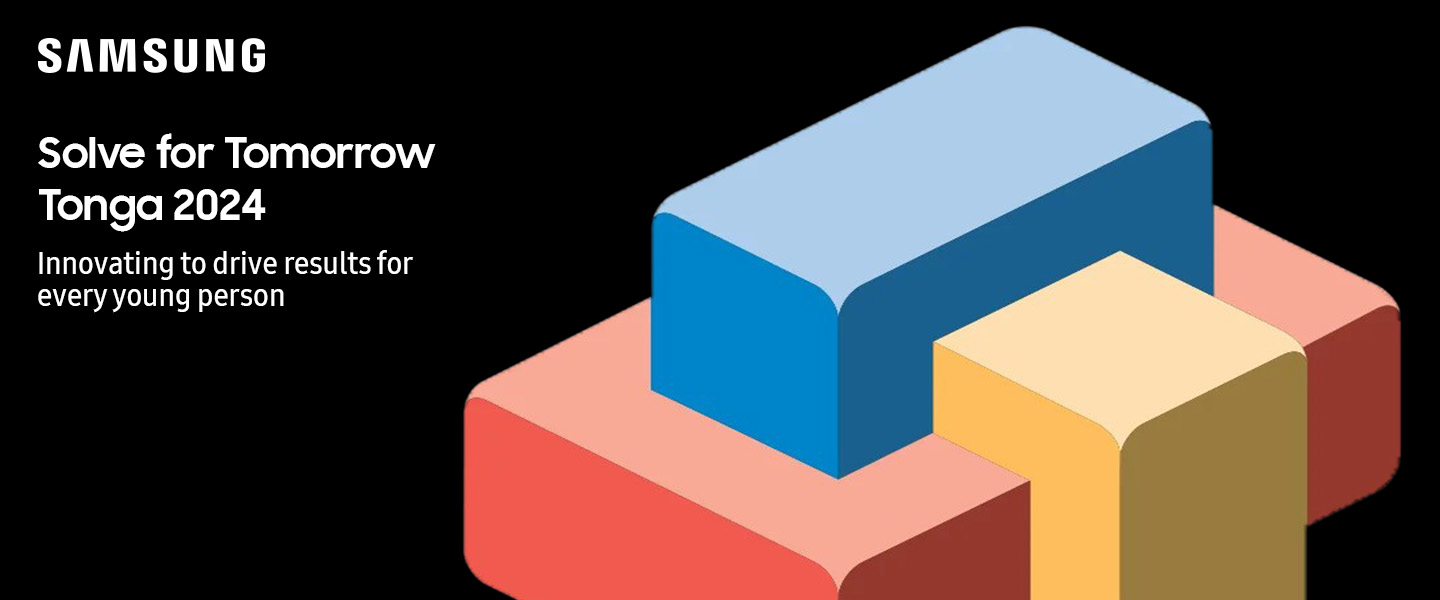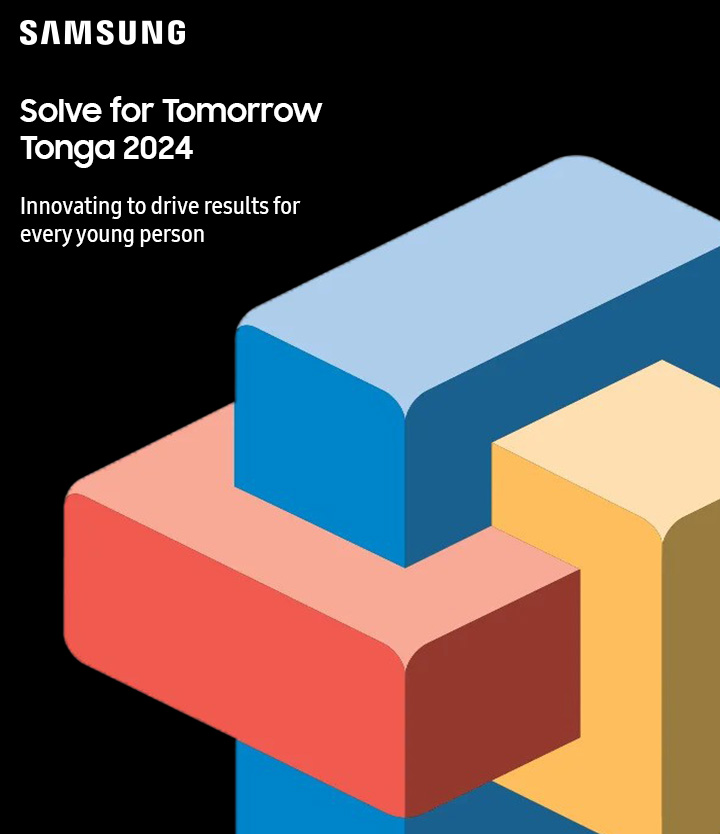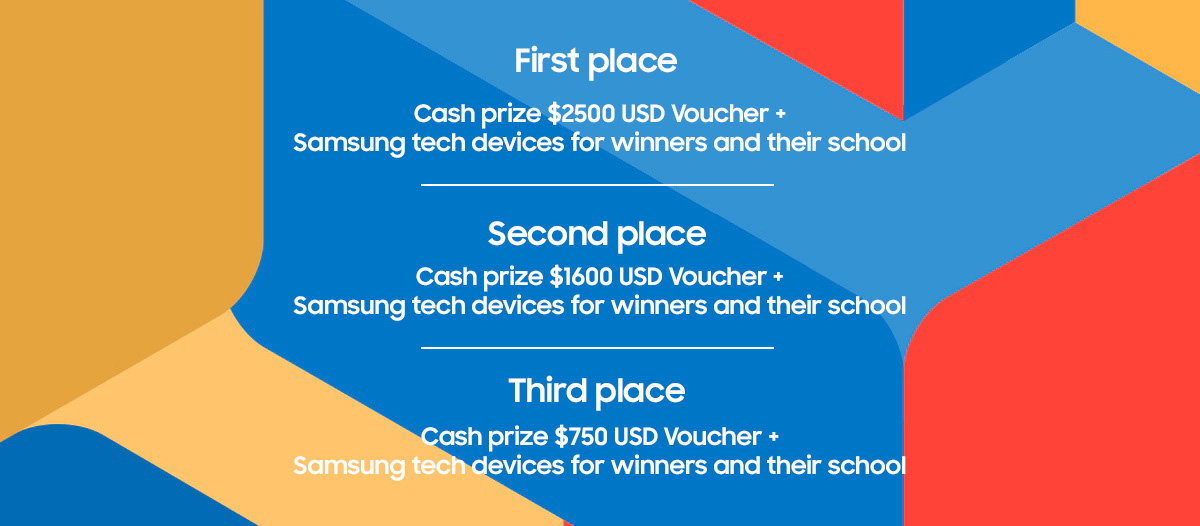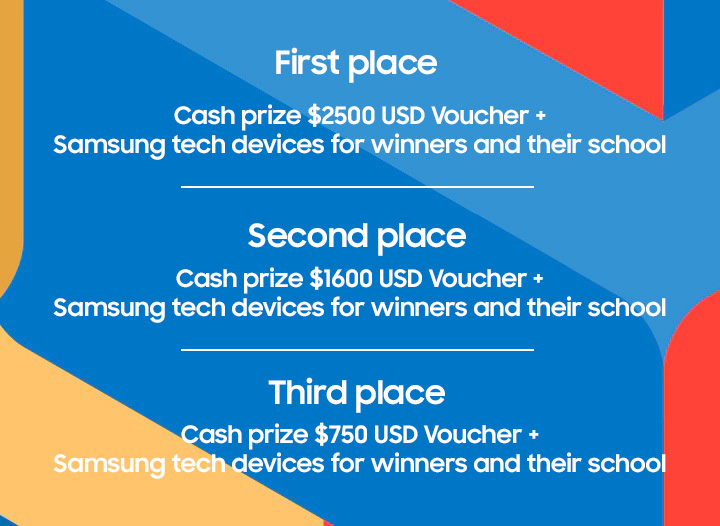

Solve for Tomorrow is a competition that challenges Tonga's next generation of innovators to unleash their creativity and use STEM to make a positive impact in their communities.
Delivered in partnership with Tonga National University (TNU) and the Tonga Ministry of Education and Training, this competition is open to secondary school students across Tonga. Finalists will receive prizes as a team and for their schools.
The opportunity
The Solve for Tomorrow competition aims to foster interest and proficiency in STEM (Science, Technology, Engineering, and Maths) and challenges 13 to 17-year-olds in Tonga (Years 8 - 11) to demonstrate how design thinking can be applied to improve their communities.
Simply identify an issue your community is facing - check out the New Zealand 2023 winners and the Pacific winners for great examples - then unleash your creativity and demonstrate how STEM and design thinking can be applied to create an amazing new solution.
Prizes
Samsung is putting up a selected range of awesome tech and cash prizes for the winners.


Resources
Teacher resources
If you're a teacher and want to learn more about how this competition could work for your students, view our educator resource.
You can also check out our Solve for Tomorrow Project Plan or Design Thinking Toolkit.
Our friends at the New Zealand Solve for Tomorrow team have kindly developed some design-thinking resources for teachers to download and help students with their entry projects.
How to enter
Entry is simple - there are just two steps to complete.
Step 1 (recommended)
Download and complete the online application form.
- Online forms shall be completed by teams who have submitted their Expression of Interests on 11 October 2024.
Step 2 (required)
- Submit the online application form by 18 October 2024 at 23:59 TOT Hour.
Entries can be submitted in the following formats:

Word description + A2 or A3 size Poster showing diagram / model / Artwork
(Max 500 words) (submitted via PPT, pdf, video or jpg format)

Presentation PowerPoint
(max 10 slides)

Video Presentation
(max 5 minutes)
Criteria
Relevance (20%)
- Identifying an issue that impacts your community or group of people.
Feasibility (30%)
- Feasibility of the solution with current technology and resources considered.
Creativity (20%)
- Creativity and originality of the idea
Application of STEM (20%)
- Application of STEAM to help solve the problem / issue
Presentation (10%)
- How well the idea is communicated.
Timeline
Team Expression of Interests
18th - 29th November, 2024 (2 weeks)
Submission Deadline
6th December, 2024
Announcement for Semi-Final
31st January, 2025
Semi-final Pitch
14th February, 2025 (after 2 weeks from the announcement of Semi-Final)
Final Submission Deadline
28th February, 2025 (after 2 weeks from the Semi-Final)
Final Pitch
14th March, 2025 (after 2 weeks from the Final Submission Deadline)
Our judges

Coming soon...
Coming soon...
Coming soon...

Coming soon...
Coming soon...
Coming soon...

Coming soon...
Coming soon...
Coming soon...

Shannon Watts
Group Marketing Director at Samsung NZ
Shannon Watts is the Group Marketing Director for Samsung New Zealand, ranked 5th in Global Brand Value, working across the entire portfolio from leading mobile phones and TVs through to your staple home appliances. She oversees the Marketing Communications, Digital Marketing, Corporate Comms & Market Intelligence.
Shannon is from New Zealand but spent ten years overseas working in Canada, Ireland and the UK, before returning to New Zealand.
She worked in the beauty industry for nearly 20 with eight years working in London for Coty Beauty UK before returning to NZ as Marketing Director for L'Oreal Consumer Produces for six years. Shannon then moved across to Mars New Zealand where she headed up the marketing team across confectionary, food & petcare.
Watts brings with her a wealth of local and international FMCG marketing experience in addition to consumer electronics, along with digital brand building and a strong focus internally within people and culture.
Read More...
Maria Hill
Business Director at Cheil New Zealand
No stranger to technology marketing and solving problems in the community, Marysia Hill was born and raised in Poland. Armed with a Masters degree in English and Linguistics as well as Executive MBA from Helsinki School of Economics, she then moved to London to work across the European market for Samsung.
Prior to joining the Samsung/Cheil family, she worked on an Action Aid Project, helping build houses for Freed Camayas in Nepal. It is experiences like these that make her an ideal judge for students' Solve for Tomorrow projects, as they adapt the latest in technology to face current issues in their communities.
For the last 13 years, Marysia has held various roles with Cheil working for Samsung, currently holding the position of Group Business Director for Samsung New Zealand at Cheil New Zealand.
She's worked across many international markets, ensuring smooth operations and content management, and leading marketing initiatives across 12 languages. Some of her strategies for digital and social content have since become Samsung global best practices.
As well as taking a central role in Samsung' Solve for Tomorrow programme in Pacific Islands, Marysia has also been involved in the Samsung Enabling People Project with the Prince's Trust charity in the UK, aiming to inspire, nurture and cultivate entrepreneurship in young people.
Read More...FAQ
-
Who can enter?
Year 8-11 students plus their teacher(s). Solve for Tomorrow is open to teams consisting of 3-5 students.
-
Can I enter my science fair project?
Yes, you can enter a project from a previous competition. However, you'll need to make sure your project meets the judging criteria
-
Does it cost to enter?
No. Solve for Tomorrow is free to enter and there is no purchase requirement.
-
How many times can I enter?
Each group may submit one application. Teachers may submit on behalf of their students. There is no limit to the number of entries per school.
-
How are entries judged and by whom?
Entries will be judged against the five key criteria. The judging panel comprises individual judges from Samsung, Academia, Non-Academic Entity such as Industry Experts, Local Craftsman.
-
I'm interested in entering my students in Solve for Tomorrow. Does it complement the Tonga curriculum?
Core objectives addressed through Solve for Tomorrow include:
- Barrier free access: There are no bad ideas, or qualifications needed. We want students to feel free to express innovative and creative ideas as they work together as a team.
- Hands-on learning: Get hands-on to create something that could make a tangible difference within the community.
- Application of STEM learning: We want to give students a taste of how STEM can be used to make a difference.
- Leadership and group learning: Solve for Tomorrow is an opportunity for both teachers and students to work together as a group, learning to share their opinions and ideas and stepping up and leading others as the project progresses.
-
Will Samsung own my idea?
No. You will retain the rights to any intellectual property surrounding your idea.
-
Where can I read the competition T&Cs?
See all T&Cs here.
-
My question is not answered here
Please forward any enquiries to support@solvefortomorrow.to
Partners

Contact us
If you need to reach us, email support@solvefortomorrow.to